Admission for MBBS-MGHD Program
February 19, 2025 2026-02-17 12:28Admission for MBBS-MGHD Program
Admissions for MBBS-MGHD
UGHE’s Bachelor of Medicine, Bachelor of Surgery (MBBS) – Master of Science in Global Health Delivery (MGHD) integrated degree program will train clinician-leaders who are prepared to diagnose and solve problems at any level in health care – from treating an individual patient’s illness to improving entire health systems.
There are two components of the programme – the MBBS degree and the MGHD degree, which is already approved as a stand-alone degree by the Higher Education Council.
Applications for the MBBS-MGHD Class of 2032 Are Now Closed!
The integrated MBBS-MGHD program will:
- Train doctors who are prepared to confidently and proficiently act as general practitioners in Rwanda and elsewhere upon graduation.
- Deliver excellent quality, hands-on instruction in the basic sciences and research practices.
- Build the capacity of Rwandan faculty in medicine and the basic sciences, while ensuring that UGHE delivers on an international quality of education.
- Support the Government of Rwanda in its overall strategic plans, as well as plans for the education and health sectors; and
- Utilize partnerships with top-quality international universities to strategically apply the expertise of senior, experienced researchers, specialists, and basic scientists to medical education at UGHE.
This programme will deliver on UGHE’s aspirations to strengthen Rwanda’s health and education systems in a way that also supports the overall strategic plans of the Government of Rwanda.
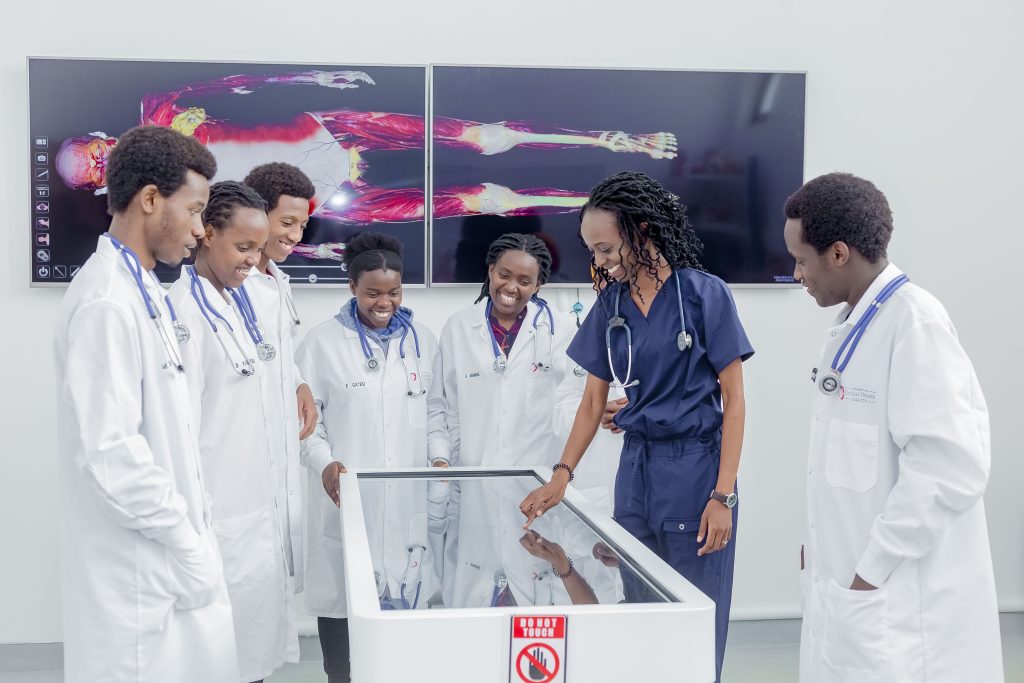
Programme Content
Although the MBBS-MGHD programme curriculum introduces several innovations, it is designed to build upon the existing curricular requirements for medical doctors in Rwanda and East Africa. MBBS-MGHD graduates will complete all of the same learning objectives as a graduate of any other medical school in the region. The individual phases of the programme are described below.
Phases of the Programme
Foundations of Global Health Equity
The MBBS/MGHD program begins with an intensive Foundations of Global Health Equity Phase, which immerses students in humanities and social sciences, highlighting the biosocial dimensions of health. Its liberal arts approach to medical education is designed to broaden students’ understanding of health beyond biology, equipping them to address global health challenges and promote health equity from a socially conscious, interdisciplinary perspective.
Biomedical Sciences Foundations of Medicine
The following two years of the curriculum comprise the Biomedical Sciences Foundations of Medicine Phase, in which students develop foundational skills in biomedical sciences and clinical medicine and deepen their understanding of global health.
Clinical & Health Delivery
Next, students transition into the Clinical & Health Delivery Phase. At this stage, instruction shifts to hospitals across Rwanda, and students begin their foundational clinical clerkships. Students will also be provided with opportunities to pursue their clinical attachments in hospitals outside of Rwanda. Students are then granted temporary MBBS degrees at the end of the Clinical & Health Delivery Phase. After being granted the MBBS degree, students enter one-year internships assigned by the Government of Rwanda. After the internships, they complete MGHD coursework focusing on research, implementation science, leadership and management, and global health delivery and defend their MGHD Practicum projects.
Exploration & Development
The final years of the program are defined by the Exploration & Development Phase. Through field-based and clinical experiences that begin very early in the program, students interact with professionals and patients at all levels of the Rwandan health system while progressively taking on greater clinical responsibilities.
Program Phase | Duration |
Foundations in Social Medicine and Global Health Equity | 8 months |
Biomedical Sciences Foundations of Medicine Phase | 24 months |
Clinical & Health Delivery Phase | 30 months |
Exploration & Development Phase | 18 months |
Total Duration of the Program | 80 months |
Students are granted the MBBS degree at the end of the Clinical & Health Delivery Phase and enter a Government of Rwanda-assigned internship after being granted a temporary MBBS degree. The internship is considered a part of the Exploration & Development Phase, as it is part of comprehensive medical training, but students’ completion of internships will be overseen by the Rwanda Medical and Dental Council. Students will complete the MGHD degree after the internship is complete.
Innovation in Assessment and Pedagogy
The MBBS-MGHD programme is made unique through a focus on pedagogical innovations that encourage active learning, flipped classrooms, team-based learning, simulation, and problem-based learning. UGHE adopts a horizontally and vertically integrated modular curriculum, and which expose students early and often to community medicine and clinical practice.
Integration and early clinical exposure will break down traditional barriers between the basic sciences and the clinical practice of medicine, enabling students to see the relevance of foundational science in real-world patient care. This approach nurtures a holistic understanding of medicine, enhances critical thinking, and promotes the development of clinical reasoning skills from the very beginning of their training. All of these innovative practices are intended to advance medical education in Rwanda and encourage collaborative innovation with other medical schools in the country.
Assessment in the programme (and advancement between phases of the programme) wis designed to ensure that all students who graduate with the MBBS are able to practice as interns in Rwanda and deliver the highest possible standard of care.
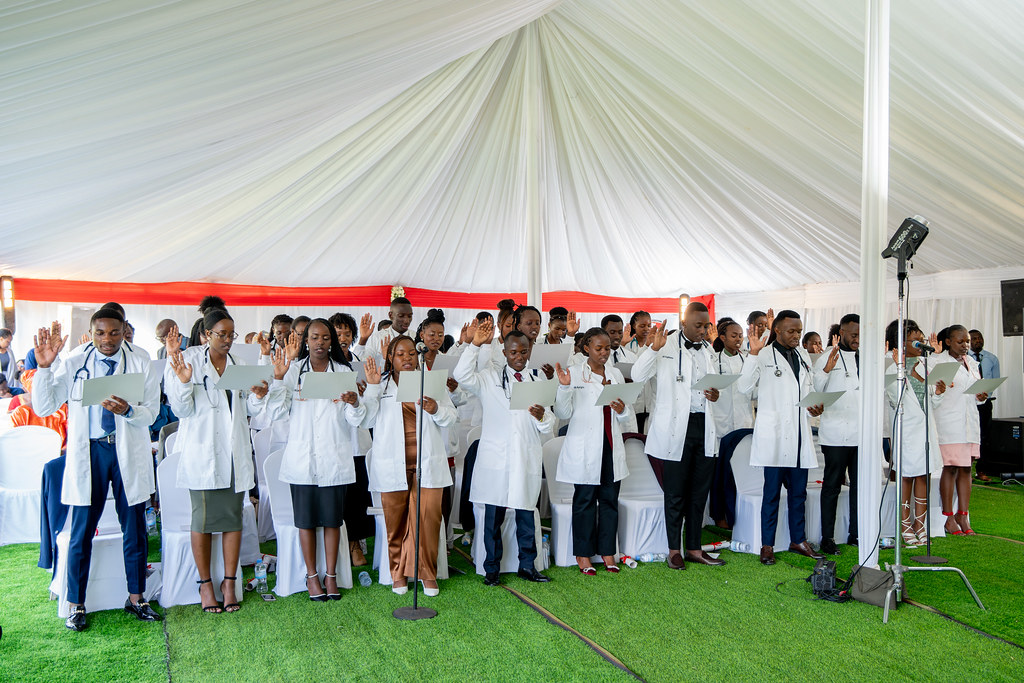
Seven Longitudinal Themes
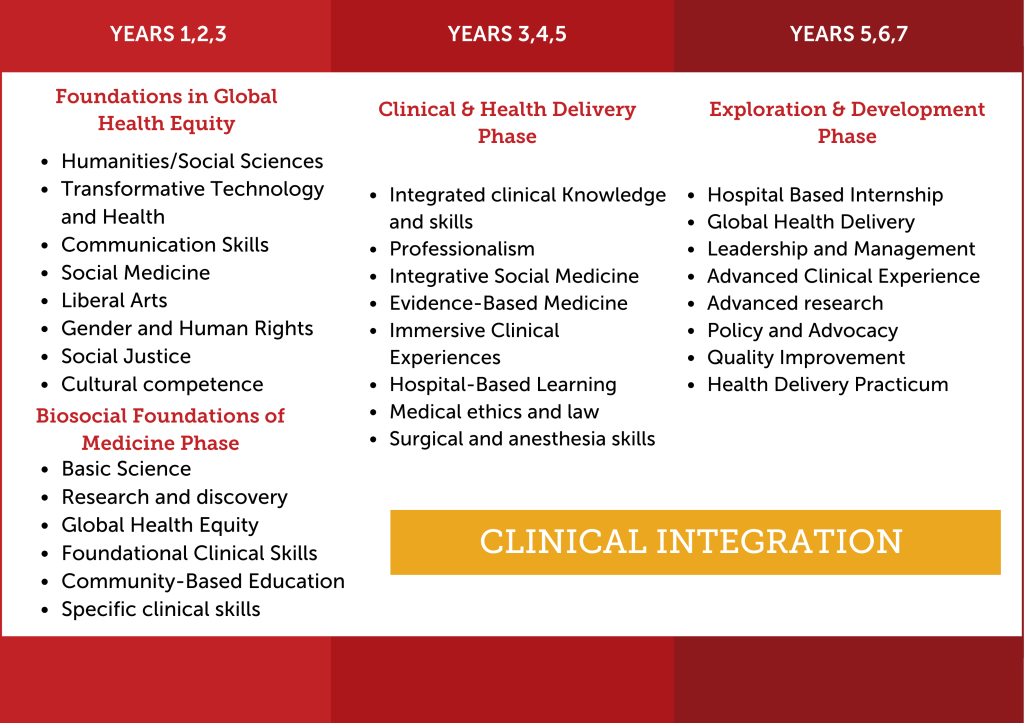
The MBBS-MGHD program is structured around seven longitudinal themes that form the foundation of its curriculum, ensuring both vertical and horizontal integration across the program’s phases.
These themes provide a cohesive framework for students to develop competencies in clinical medicine, global health, and leadership. From the outset, the curriculum has been backward-designed, meaning it begins with the desired outcomes in mind and builds educational experiences that align with those goals.
Each theme is woven throughout the four curriculum phases, ensuring consistent reinforcement and application of concepts. This approach promotes a deep understanding of interconnected medical and global health issues while equipping students with the skills to adapt to complex, real-world challenges.
What students do after graduating
The aim of the programme is to train physicians who are completely fit to practice in health care and health promotion. The programme builds on knowledge and skills acquired from secondary school and other relevant training, and every year of the programme builds upon the knowledge and skills that students gain in the previous year(s). Graduates of the medical school are expected to possess the following competencies to practice as general medical practitioners. Each MBBS-MGHD programme graduate is expected to become a:
- Medical Expert,
- Communicator,
- Collaborator,
- Manager,
- Health Advocate,
- Scholar and Researcher,
- Professional, and Global Health Equity Expert.
Admissions Requirements
UGHE prioritizes female applicants for admission to the MBBS-MGHD programme, to the extent that applicable Rwandan laws and policies are respected in the best interest of both the Rwandan community and gender equality policies.
Eligibility Criteria for Rwandan and International Candidates:
Candidates will be recruited from the following countries:
Burundi, DRC, Rwanda, Tanzania, Sierra Leone, Liberia, Malawi, Lesotho, Eritrea, South Sudan and Sudan.
Upper Secondary (A-Level) or High School Diploma.
- National exam scores with an overall aggregate score of at least 50 with Biology and Chemistry as core subjects under the following subject combinations:
- Physics-Chemistry-Biology (PCB)
- Mathematics-Chemistry-Biology (MCB)
- Associate Nursing Program (Applicable to applicants who completed their studies in Rwanda only)
- Should strictly have the following grades in each of these subjects:
- Biology – grade/score A or B
- Chemistry – grade/score A or B
- 3rd subject: Mathematics or Physics grade/score A or B
- Strong written and spoken English.
- NESA Equivalency certificate for any candidate with foreign qualifications.
- Rwandan and International candidates that completed their high school (i.e. A ‘Level or Senior 6) strictly in 2025 are eligible to apply.
- Applicants with a bachelor’s degree in any of these specialties: Nursing, Laboratory Science, Pharmacy, Radiography, Anesthesia, or other fields closely related to health care.
Note:
- Having an undergraduate degree does not guarantee applications will be processed.
- All applicants with an undergraduate degree should submit their Equivalency certificates for their A’level or high school leaving certificates which have at least grade” C” in any A-level subject combinations that includes Biology and Chemistry principal subjects.
- All undergraduate degrees and A-level scores need to be evaluated, and equivalency determined by NESA.
Eligibility Criteria: For Candidates with refugee status in Rwanda or Refugee status in any African country:
The following candidates are eligible to apply:
- Non-Rwandan nationals with refugee status in Rwanda.
- Non-Rwandan nationals with refugee status in any African country.
Upper Secondary (A-Level) or High School Diploma.
- National exam scores with an overall aggregate score of at least 50 with Biology and Chemistry as core subjects under the following subject combinations:
- Physics-Chemistry-Biology (PCB)
- Mathematics-Chemistry-Biology (MCB)
- Associate Nursing Program (Applicable to applicants who completed their studies in Rwanda only)
- Should strictly have the following grades in each of these subjects:
- Biology – grade/score A, B or C
- Chemistry – grade/score A, B or C
- 3rd subject: Mathematics or Physics grade/score A, B or C
- Strong written and spoken English.
- NESA Equivalency certificate for any candidate with foreign qualifications.
- Only refugees that completed their high school i.e. A ‘Level or Senior 6 strictly in 2024 and 2025 are eligible to apply.
- Applicants with a bachelor’s degree in any of these specialties: Nursing, Laboratory Science, Pharmacy, Radiography, Anesthesia, or other fields closely related to health care.
Note:
- Having an undergraduate degree does not guarantee applications will be processed.
- All applicants with an undergraduate degree should submit their Equivalency certificates for their A’level or high school leaving certificates which have at least grade ”C” in any A-level subject combinations that includes Biology and Chemistry core subjects.
- All undergraduate degrees and A-level scores need to be evaluated, and equivalency determined by NESA.
Information and Steps about Applying for Equivalence
In Rwanda, the National Examination and School Inspection Authority (NESA) is the responsible body for evaluating and granting equivalence for foreign secondary education certificates. Below is the list of documents required when applying for equivalence.
Required documents
1. Notarised Advanced Level or high school leaving certificate (results slip is not allowed)
2. National ID for Rwandan citizens, Passport for Foreign nationals, Refugee ID. If you have changed your name, please attach a sworn affidavit together with a copy of your ID or passport).
3. Visa or Master Card or Rwanda MTN Momo (for paying the application fee)
Steps for applying for high school equivalence certificate.
Here is the link to apply for the equivalence certificate. Proceed to the tab titled Education: “Application for Equating Foreign qualifications (Primary and Secondary School)”.
Refer to this link for steps to follow during your application for equivalence.
Click this link when you need to do a follow up of your Equivalence Application to Irembo. Quote your Irembo Billing Number.
Due to its small class size of students and a focus on educational quality and excellence, UGHE does not accept credit transfer from other institutions of higher learning in exchange for course work and satisfactory progress in the MBBS/MGHD programme.
Application Process
To apply, students shall submit demographic information, educational information (including national exam scores for A-level or Senior 6), contact information, and a brief personal statement that outlines their educational and professional goals. These materials will be screened by UGHE’s Office of Admissions and applicants will be invited to sit for an admissions exam and interview developed by UGHE.
Important Dates for the MBBS-MGHD Class of 2032 Admissions Process
Please be mindful of the following dates. All candidates who advance in the process will be required to sit for an entrance exam and an admissions interview, as per the schedule below.
| Date |
Application Opens | 29 September 2025 |
Application Closes | 16 January 2026 @ 5:00 PM CAT |
Applicant Exam | February 2026 |
Applicant Interviews | March 2026 |
Final Decision | April 2026 |
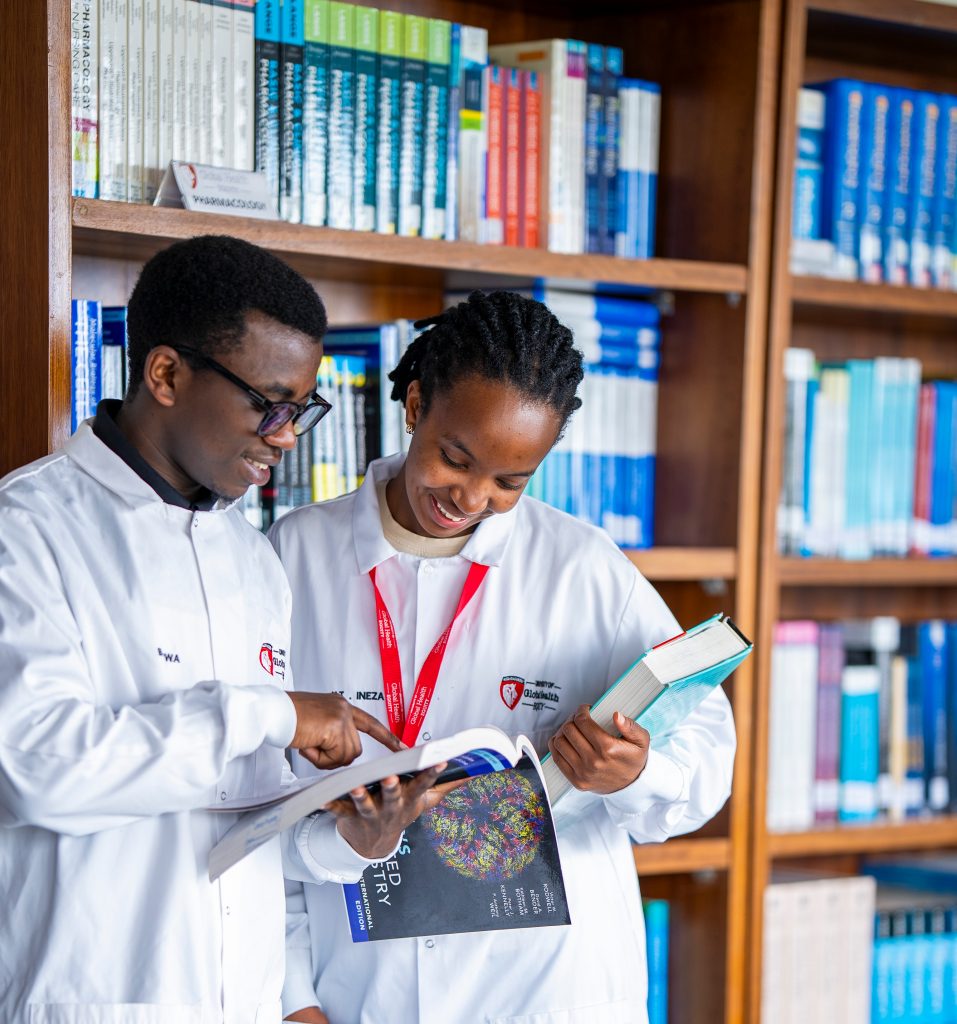
Applications for the MBBS-MGHD Class of 2032 Are Now Open!
Admission FAQs
When do applications for the MBBS-MGHD Program open?
Applications for the MBBS-MGHD Class of 2032 are Open from 29 September 2025 to 16 January 2026.
What is the timeline for the MBBS-MGHD 2025/2026 intake admissions process?
Approximately 15 weeks
Does the MBBS-MGHD accept international applicants?
YES, UGHE is accepting applications from these countries: Burundi, DRC, Eritrea, Lesotho, Liberia, Malawi, Rwanda, Sierra Leone, South Sudan, Sudan and Tanzania. Non-Rwandan nationals with refugee status in Rwanda and Non-Rwandan nationals with refugee status in any African country will be considered.
I applied to the MBBS-MGHD program last year but wasn’t accepted. Can I reapply?
Non-Rwandan nationals with refugee status in Rwanda and Non-Rwandan nationals with refugee status in any African country who have applied to the MBBS program in 2024 but have been unsuccessful are encouraged to re-apply. They are the only candidates that can apply twice to join the program.
I am already a medical student in a different university. Am I allowed to apply?
NO. UGHE does not accept transfer students. A transfer student is one who applies to UGHE after having begun his or her study program at a different university or school.
If I am accepted into the MBBS-MGHD 2025/2026 intake but choose not to attend, can I defer my acceptance?
- Acceptance into the MBBS-MGHD Class of 2032 does not guarantee acceptance in the future. If an applicant chooses to decline his/her offer, s/he is required to reapply for admission.
- If a student who has dropped out of the program would like to rejoin, they must re-apply to the program through the normal application process.
If I have international Advanced Level results, am I eligible to apply?
Yes, you are. Any candidate with foreign qualifications should apply for the NESA Equivalency certificate. Application information is on this link.
Can I complain, or challenge the Admissions process?
YES, you can. Complaints or concerns related to UGHE’s admissions policies or procedures must be brought to the UGHE Registrar in writing for review. If the concern or grievance is related to the UGHE Registrar, it should be brought in writing to the DVC – Acade for review.
How do we assure transparency?
UGHE aims to educate students who have a global interest, a commitment to leadership, and a desire to address issues of inequity and disparity through health delivery. UGHE Registrar’s Office aligns with this vision by considering all applications in a holistic and equitable manner. The Office values all aspects of an applicant’s profile, including but not limited to supplemental documents, National Exams results, admissions exams and interviews, and overall alignment with the University’s mission and vision.
Fees and Funding
UGHE believes that a student’s financial capacity should not determine their ability to become a global health leader, and the University was founded on the principle that its graduates should use their knowledge to positively impact the development of Rwanda and beyond. In lieu of payment of tuition and boarding fees by UGHE, students are required to commit to a specified number of years of professional service to vulnerable populations under the employment of the Ministry of Health and respective Ministries of Health in their countries.
The MoH will fully remunerate the student for the services provided at the rate and in line with the policies and procedures of the MoH. Upon successful completion of the MBBS-MGHD degree and graduation from UGHE, the Student shall inform and report to the Ministry of Health within a period of not more than (15) working days. The student understands and agrees that his or her enrollment in the MBBS-MGHD program at UGHE is contingent on signing both the MoH Employment Agreement and the UGHE Agreement and their acceptance to UGHE will be withdrawn if they fail or decline to sign both Agreements.
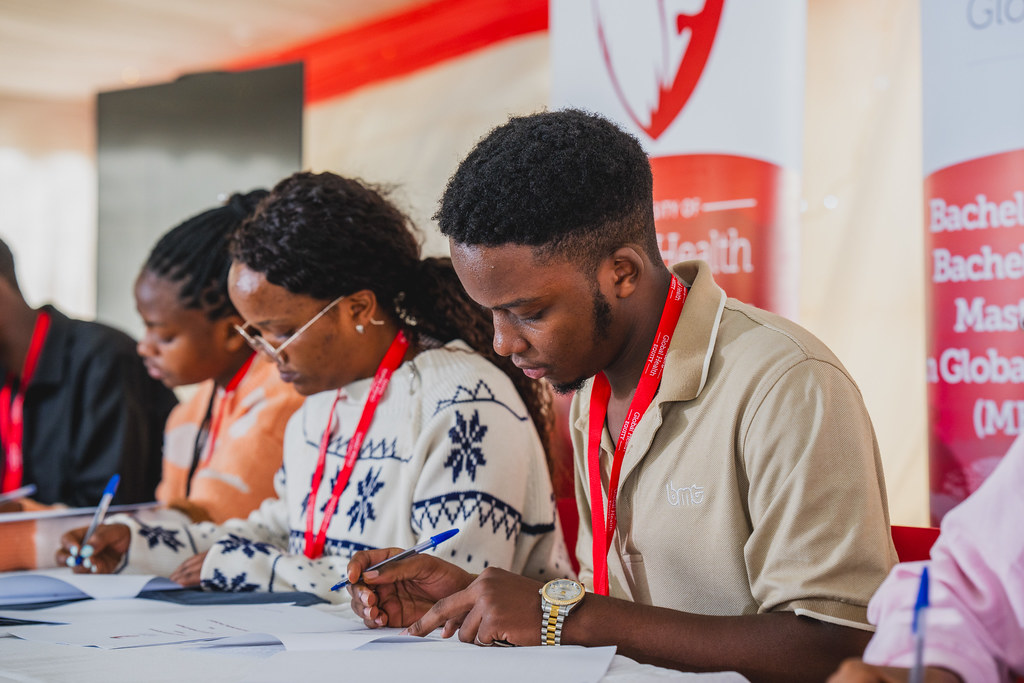
Public Service Agreement
Prior to or in connection with initial enrollment in the MBBS-MGHD degree program at UGHE, the Student will agree to sign the Employment Agreement, committing to certain years of professional service as part of the Public Service Agreement program with the University. The student understands and agrees that his or her enrollment in the MBBS-MGHD program at UGHE is contingent on signing the Employment Agreement and that the Student’s acceptance to UGHE will be withdrawn if the Student declines to sign or otherwise terminates or withdraws from the Employment Agreement.
Can I opt out of the Public Service contract after graduation?
NO. An exception can be made to work only for two (2) years if the student is going to pursue clinical residency training or Advanced Basic Sciences training. This decision is at the discretion of the Ministry.
However, the Student shall be obligated to repay the University all tuition and boarding fees for his/her MBBS-MGHD studies at UGHE in the event that he or she: fails to complete his or her years of service. However, the repayment does not preclude the student from incurring other penalties or charges specified in more specific regulations that he or she is party to
Under the Scholarship:
- Students will not pay tuition to enroll in the MBBS-MGHD program.
- Students will agree to serve as a doctor for a designated years’ of service among the vulnerable population, under an agreement with the Ministry of Health and UGHE.
- Students will still earn a full salary during their years of service, as determined by their employers.
What is included in my tuition?
The University will pay only for tuition, housing at the UGHE dormitories, food, local health insurance, all academic related costs, including projects and field trips.
What materials will UGHE provide for my studies?
All students will receive a laptop for the duration of their studies, loaded with all necessary course software. Additionally, Students are provided with all academic content in the form of books, manuals, online tools, and video and audio recordings throughout the program. These materials are of no additional cost to the students. However, UGHE will not replace broken, worn out or lost laptops.
Additional Expenses?
Students need to pay for their own transport, as well as all necessary visa fees for their stay in Rwanda. Additionally, students are required to bring their own personal items and toiletries (e.g. school supplies, laundry detergent, sanitary items, hair salon and barbershop services, phone airtime, etc.). UGHE does not provide students with pocket money or living stipends. You will receive a packing guide and more information on what can be found in Butaro in the welcome packet.
Student Visa?
Once in Kigali, you will be applying for a Sub Class U1 Student Permit for 20,000 RWF (approx. $22-25 USD depends on the exchange rate). You are responsible for paying for your Rwanda visa fees, and UGHE will provide any necessary documentation for the visa application to support in the process, and more information on this process will be included in your UGHE welcome packet.
Is airfare/transportation to and from Rwanda included?
Transport from your home to Kigali or Rwanda is not provided by UGHE.
Campus Life
Are there accommodations available?
- Room & Board – Student tuition includes full room and board. This includes a furnished, shared apartment, 1-bedroom (2 students per room), shared bathroom unit with other students. You will share a bedroom with one other student. All housing units house students according to their sexual orientation meaning female students will live with only other female students, and male students will live with only other male students. This also includes utilities (e.g. water, electricity, internet) and all of your meals.
- Each floor has a kitchenette shared with other students, which is furnished.
- Family Housing – UGHE does not provide family housing on campus, and students are responsible for finding external housing on their own if they will be accompanied by family members. Please note that there are limited housing options in Butaro, so many students opt to either come without their family members or seek housing in Kigali or Musanze. Students are also responsible for all logistics related to family members, including visas, housing, transportation, etc.
Is transportation to and from the Butaro campus available?
Transportation within Rwanda is only provided for UGHE-related activities.
What on-campus services are available?
Living on UGHE’s campus, residents will have access to a range of services including UGHE’s dining hall serving three balanced meals a day; athletic facilities such as the gym, yoga/exercise studio, and outdoor basketball court; transport shuttle going to and from Kigali every weekend; janitorial and laundry support; IT services; a campus store for picking up basic necessities; full time campus security coverage, and more.
Are work-study opportunities available?
UGHE aims to build a culture of service on campus. Therefore, all UGHE students are required to participate in an unpaid, part-time work study as part of their acceptance to the University. Part of your scholarship includes a required work study, which is an unpaid and required part of your scholarship package and will support you in your professional goals and development. During orientation week, the Campus life Coordinator will meet with you to determine the best work study placement for you, as well as a work schedule for the academic year. Each student will be attached to a work that will not compromise his/her academic life but that will contribute to acquiring a number of skills.
Can I use my own health insurance?
MBBS/MGHD students will receive health insurance for the duration of their academic stay at UGHE. Students will be receiving a detailed information session on this insurance scheme and coverage during the orientation week.
I've been admitted
Aline Mukasa, MBBS-MGHD'30
I am so excited to join UGHE to share and learn from the great experiences everyone has accomplished. I have always dreamed of learning and working in a health care field especially now that I have got an opportunity in the best institution UGHE is!
Angelo Charles Dukuze - MBBS-MGHD'30
I am excited to join UGHE, mostly because I finally get to study medicine, which is my passion. Unlike in high school, where I studied without a clear vision and without knowing exactly if I would make it into medicine, now I am going to study while having a clear vision, and all of that in one of the best medical schools in Rwanda.


